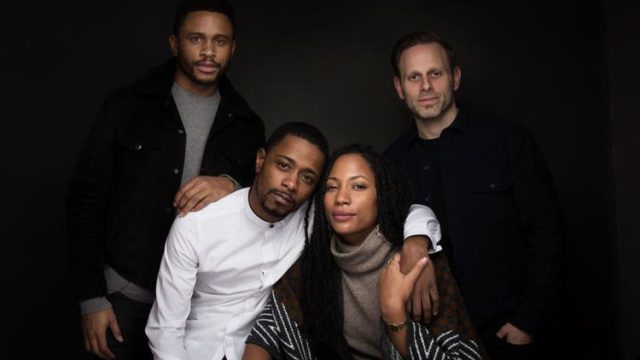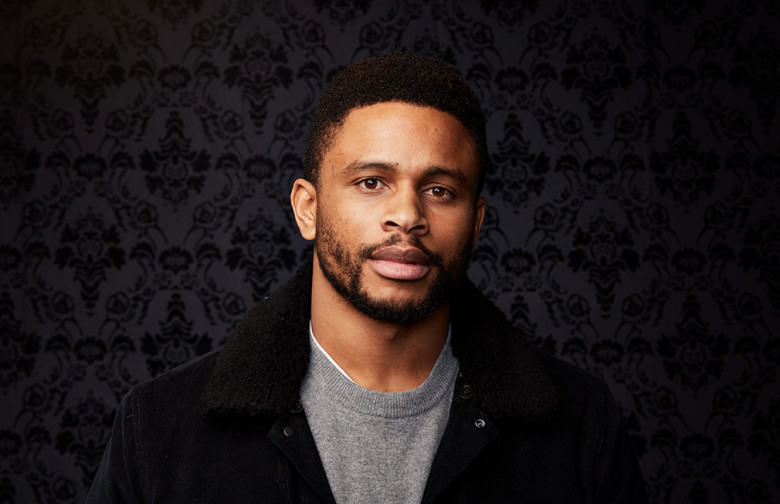
NFL cornerback-turned-actor Nnamdi Asomugha stars as King, with Atlanta’s Lakeith Stanfield starring opposite as Warner.
“There was something very altruistic about him. It was like he wanted to free all people from any sort of injustice,” said Asomugha of King, whom he spent time with in New York prior to the feature heading into production.
After being cast, Asomugha also joined Crown Heights as a producer, helping to convince writer-director Matt Ruskin that the film’s production should move from New Orleans to New York, where the real events took place. He was inspired by director Cary Fukunaga, whom he worked with as an exec producer on Beasts of No Nation, saying, “He just always talked about authenticity and making sure your films are as true to life as possible.”
Crown Heights will had its world premiere on Jan. 23 in the Sundance Film fest’s . 23 in the Sundance Film fest’s U.S. dramatic competition section. It will be Asomugha’s first Sundance because his football schedule always conflicted in the past. (Asomugha spent time on the Oakland Raiders, Philadelphia Eagles and San Francisco 49ers.)
“Every time Sundance would come, I would want to go,” he explained, “but then I would realize I was in pain because the season had just ended.”
Nnamdi is married to super star actress, Kerry Washington and they are blessed with two children
Following is an LA Times full narrative on the events that led to the making of the movie.
To this day, Carl King can’t quite explain why he did it. Why he sacrificed 20 years of his life. His marriage. His financial security. All in a long shot bid to get his friend Colin Warner out of prison.
“Maybe it was that I grew up in a family, in Trinidad, where my older siblings were always involved in student activities,” King said. “Or maybe it just felt like a purpose. It’s your brother, and you’re not going to give up until you can help him.”
In 1980, Warner was 18, living in the Caribbean section of the Brooklyn, N.Y., neighborhood of Crown Heights. One day, the cops showed up and arrested him. He was charged with killing Mario Hamilton, a young Jamaican man in nearby Flatbush. Warner had never met Hamilton. He had never even heard of him.
In most situations, Warner would have been released quickly and the charges dropped. There was no physical evidence to implicate him and no credible witnesses either.
But the events, as told in Matt Ruskin’s new distribution-seeking Sundance movie “Crown Heights,” unfolded more tragically. With Lakeith Stanfield as Warner and Nnamdi Asomugha as King, the film offers a new twist on the buddy movie — one far more serious than slapstick. “Crown Heights” is a pointed reminder of the gaping flaws in the criminal justice system and the power of perseverance and loyalty to overcome them.
As the film suggests, a mix of ineptitude and institutional racism had Warner sitting in jail for six months. That’s when the cops picked up Norman Simmonds, an acquaintance of Hamilton’s who also had no idea who Warner was. All signs pointed to Simmonds as the killer. Yet somehow, he and Warner were both charged with collaborating to kill Hamilton. They went on trial together. When, after a hung jury, Simmonds declined a plea deal that would have freed Warner, the men went on trial a second time.
And when another jury — during a time of heightened racial tension in New York — found Warner guilty despite a paucity of evidence, the teenager was doomed. A judge was required to sentence him to a minimum of 15 years to life in prison. Warner maintained his innocence.
Enter King, also Trinidadian. Several years younger than Warner, King had developed a bond with his fellow immigrant in their Brooklyn neighborhood after knowing him only casually as a young child in their home country.
King began to visit his pal in jail, committing to him that he would do whatever it takes to get him out.
“I remember going in and always thinking about his feelings. Even if I was down in my personal situation I knew couldn’t tell him about it because I didn’t want him to be down too,” King said in his rich island accent. “We’d end and I’d be walking out one way and he’d be going the opposite way, back to his cell. And I always thought, ‘We need to be going the same way.’ ”
King, 53, still lives in Crown Heights, in a home he bought a few blocks from where he grew up. Sitting in his spartan living room on a recent afternoon, wearing a nondescript fleece hat instead of his old dreads and slightly portlier than he is in archival photos, he does not cut the image of a tireless firebrand. But he was — and in many ways remains — precisely that.
As Warner languished in jail, King began collecting money — hiring lawyers, researching options. He would consult experts, share tidbits with Warner, then consult some more. Motions were filed, the case wending its way through court.
But appeals — made, as they often are, on legal grounds — were denied. There simply were not enough provable attorney or police mistakes to earn an overturn, not in the inhospitable confines of the then-New York City Mayor Ed Koch era in the case of a black man accused of killing another black man, anyway.
Nor was every activist a friend. At one point, celebrity civil-rights attorney William Kunstler joined the case. The move only highlighted the system’s deficiencies.
“I thought from the name he was a big bad wolf. But he didn’t prepare at all. He was asking me questions about the case,” King recalled of the now-deceased attorney. “He and the prosecutor were joking around; he and the judge were telling stories. I’m wondering, ‘What’s going on here?’ It seemed like a checkers game — whoever makes the best move wins. And I’m thinking, ‘This is somebody’s life.’ I became less naïve after that.”
King pressed on. Months turned to years, then more years. The 1980s were now the 1990s. Warner was no closer to being released. His steadfast belief in his innocence may have been a hindrance to his release: a parole board turned down his request after he declined to confess and show contrition for the crime.
Meanwhile, King’s wife was losing patience with how much time he spent away from his family, chasing down leads about the case. As he cycled through lawyers, bank accounts were drained too. The marriage ended. Money became even tougher to come by.
But King decided to double down. He took a job as a court process server because it would help him meet lawyers. He sought any scrap of advice on fighting the system that he could. At one point, he even enlisted his real estate lawyer.
And then, fortunes began to turn. King met William Robedee, a small-time lawyer who, unlike other attorneys, began looking at the facts of the case instead of trying to win on judicial grounds. Soon, King and Robedee were plotting a new strategy: revisiting the murder itself instead of just the legal technicalities. It was, they thought, their only remaining avenue.
And sure enough, the pair soon had a breakthrough: They succeeded in tracking down Simmonds, who had served nearly a decade in prison, and convinced him to testify. Then a new witness, whom King found by pounding the pavement in the Bronx. Then another witness. It all led them to Mario Hamilton’s brother, Martell, who agreed to testify that he didn’t think Warner had committed the crime.
In 2001, after Warner spent 21 years in jail for a crime he didn’t commit, a judge exonerated him.
“I still remember that day. We couldn’t believe it: Robedee, Antoinette [Warner’s girlfriend-turned-wife] and me,” King said. “So much time, and all of a sudden, he was free.” Then he turned wistful. “It seems like a long time ago, but like it just happened.”
Warner said the ordeal remains a surreal, decades-long nightmare, with his friend the only ray of light.
“I don’t think you can understand. Carl was my angel,” Warner said in a phone interview from Georgia, where he lives with his wife and daughter. “But he was in prison too because he lost so much.”
Ruskin said King’s level of devotion took on an almost existential component.
“What struck me is how Carl couldn’t go back to being business as usual,” said the director, an indie filmmaker who wooed the principals after they had previously sold options to Warner Bros. and DreamWorks. (The project came to Hollywood’s attention with an extended “This American Life” story 12 years ago.)
“It was about Colin, but it was also bigger than that for Carl. It seemed like a big piece of his identity was defined by not being OK with letting this go.”
Throughout years of film development, Ruskin recalled, King and Warner would take radically different attitudes, the former being persistent with weekly check-in calls and the latter taking an if-it-happens-it-happens approach.
“Each of their reactions was like a window into how they approached life,” Ruskin said. “Colin was just waiting and being Zen. Carl kept persevering and not taking no for an answer.”
King is working on other cases, a kind of self-taught legal investigator, filling in the holes that a system continues to leave open. Fifteen years after freeing Warner, he’s working the backrooms of Brooklyn politics, the twisty corridors of the legal system and the wilds of the streets to ensure other Colin Warners taste freedom.
He’s currently pursuing a case of a retail-store employee accused of killing a co-worker (he asked that the specific case not be identified). What was the gesture of a friend has become a lifetime crusade. King takes no money for his efforts.
He pulls out photos of the new case, showing them alongside old snapshots and news clippings of him and Warner. Why he was so devoted to Warner — after so many years and so many of the prisoner’s own friends and family giving up — still eludes explanation.
“I tried to question Carl many times. I don’t think he knows the answer,” Warner said.
In his apartment, King tried to reflect on his own motives.
“I come from a community that has a kind of African, it-takes-a-village mentality,” King said. Then, realizing that may not be a sufficient explanation, he doubled back. “I sometimes think I just like to make quiet noise. And I keep making it until someone listens.”








Comment:The truth may delay but wil surely come out 1 day.